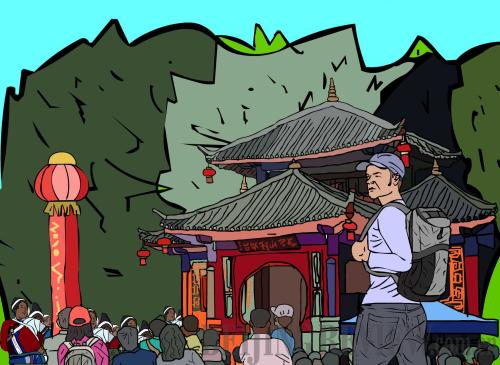|
 |
|
(LI SHIGONG) |
"Go west, young man, go west and grow up with the country," is a phrase most commonly attributed to newspaper editor Horace Greeley in 1865, as American westward expansion hit a fevered pitch at the end of the U.S. Civil War (1861-65). The romantic ideological spirit of manifest destiny inspired the occidental ambitions of many young people seeking new opportunities.
As a young man graduating from university, and one fully aware of the imperialistic conceits informing that period of American history, I did with the slogan what Karl Marx did with G.W.F. Hegel's idealism, and turned it on its head: In my search for an approximation of the American Dream, I went so far over the Pacific that I ended up finding work in bustling Beijing.
So what is a small-town American expatriate to do in order to escape the manifest density and breakneck pace of modern Chinese urban development in search of a little inner peace? I took a few pages out of the Chinese epic Journey to the West, because although I'm not nearly as strong or as clever as Sun Wukong, the mischievous Monkey King of legend, I'm equally hirsute and almost as handsome.
Journey to the West recounts the adventures of a monk named Xuanzang on a quest to find an original Buddhist manuscript in India and bring it back to China. The epic tale is allegorical of Buddhism's deeply rooted compatibility with indigenous Chinese Taoism. Sun Wukong, an infamous troublemaker, with protecting Xuanzang, as many monsters along the path considered the monk the "longevity monk" a tempting meal. At first an unwilling bodyguard frustrated by his ward's naivete, by the conclusion of the journey Sun Wukong redeems his past transgressions and attains enlightenment with help from his friends.
But I didn't retrieve any lost sutras during my week visiting Buddhist sites in Thailand. I certainly didn't find much peace during the grueling series of bus trips through the unforgiving karst landscape of Laos. And when I crossed the border to Xishuangbanna of southwest China's Yunnan Province, I felt a lingering earthly attachment to the ubiquity of fresh bread and other Western staple foods in the former French colony I had so recently exited.
Perhaps this is what it would have been like if Sun Wukong traveled unsupervised by Xuanzang, and instead relied solely on his 108,000 li (54,000 km) cloud somersault to get from point A to point B. It was not until I arrived in Lijiang, northern Yunnan, that I was reunited with some of my friends from Beijing, and really began to enjoy my journey.
Shaxi Town is located in Jianchuan County, Dali Prefecture, a few hours southwest of Lijiang. This quiet village is situated on the Ancient Tea Horse Road. Along this trade route, mule caravans exchanged Chinese tea for Tibetan ponies. I thought I was loaded for bear with my 70-liter backpack, but the bundles of tea bricks carried by ancient traders dwarfed my meager burden.
It was also a destination for troublesome scholars, exiled from the ancient capitals by imperial authorities, to live out their days reciting poetry.
As we looked for accommodations, we were approached by a kindly old lady from the Bai ethnic minority group, who invited us to stay at her home for a quarter of what we might have paid to stay at a youth hostel. For the next few days we awoke to the crowing of roosters in this tiny courtyard enclosing a quaint vegetable garden.
In Chinese, Bai literally means "white." After I overcame my typical linguistic confusion to understand that I am bairen (white people) and they are baizu (Bai ethnic group), I came to realize that although my whiteness tends to make me stick out like a sore thumb, of China's many ethnic minority groups, the Bai people are among the most seamlessly integrated into mainstream Chinese society.
I fully realized this back in Lijiang's Ancient City District, in the company of a bar owned by a young Bai fellow, who serenaded us with a love song in his native language while playing Western folk guitar, all before decisively trouncing me in a Chinese drinking game. Chinese drinking etiquette gets me every time!
Yet for its remoteness, certain aspects of Shaxi—not the least being the Bai and Yi people's warm hospitality—made me feel quite at home. After a punishing bike trek through mountainous terrain at a far higher mean elevation than I'm accustomed to, my friends and I stopped to dine at a courtyard home. There was no menu, but the family served purple potatoes and a local delicacy called rubing, fried goat cheese. While my Chinese friends were nonplussed, my hankering for Western comfort food of potatoes 'ni' cheese was immediately supplanted by a powerful yearning for more of the local flavors, to the point where I begged my companions to inquire about rubing at every single restaurant we visited hence. So much for overcoming earthly attachments!
The author is an American living in Beijing
Email us at: zanjifang@bjreview.com | 